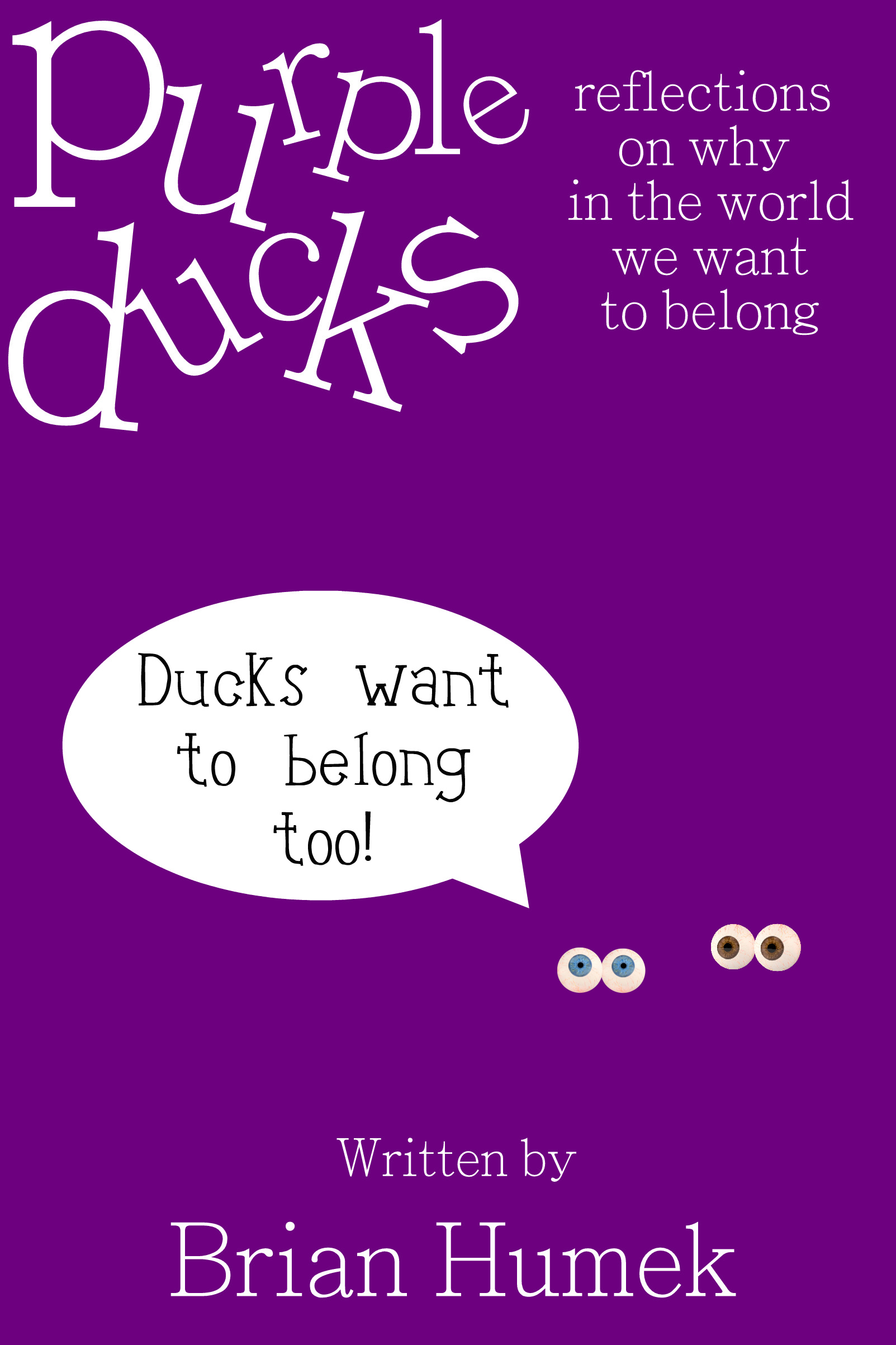Buy Purple Ducks Today
Ads Support Our Ministry
Other Great Websites
* Alan Hirsch: The Forgotten Ways * Andrew Jones: Tall Skinny Kiwi * Bob Hyatt * Dan Kimball: Vintage Faith * Dave Ferguson: Velocity * Frank Chiapperino * Ingenous Quill * Janie Mehaffey. * Jim Walton: Church Tech Matters * Jon Ferguson: Viscosity * Larry James * Mike Cope * MinistryMarketingCoach.com * Rick Cobb * The Blind BeggarTweet Blender
Our Sponsors Love You.
-
Are We Terrible People?
Romans 5:18-19 Ezekiel 18 Luke 23:50
I’ve been hanging around some folks who think we are terrible people. They say there is no good in us at all. Therefore we need Jesus to save us. I agree with part of their statement. I believe we cannot do enough good to get to heaven on our own and so we need the blood of Christ to cover our sins. If he had not died for our sins, we’d never get to heaven. But saying that we, God’s creation, are just terrible people, goes beyond everything I’ve ever thought about God.
I thought we were made God’s image (Genesis 1:26-27). I thought little children were good when they were born. Why else would Jesus say one has to be like a little child to inherit the Kingdom of Heaven (Matthew 18:3)? The King of Tyre was told by God that he was not guilty of sin until he had actually sinned (Ezekiel 28:15).The Apostle Paul told the pagan poets in Athens that we are all the “offspring of God” (Acts 17:29). I can’t believe that as his offspring, we are terrible people. Then I love the passage that speaks about the good/righteous man who has a bad kid and that bad kid has a righteous/good kid (Ezekiel 18). The point Ezekiel makes is that we won’t be punished for anyone’s sins but our own.
God promises that we won’t pay for what someone else has done. Look at it this way, if my Dad cheated on his taxes, I wouldn’t go to jail or pay a fine for what he did. God promises that won’t happen. That would be like Adam, the first man in the world, sinning. Because of his sin, we hit the evil jackpot and all of us when we are born, become terrible people. That’s sort of sounds as ridiculous as someone saying my Chicago Cubs are going to win Baseball’s World Series this year, or any year for that matter.
The Bible does say that because Adam sinned, we all have experienced death and sin entered the world (Romans 5:12). Looking further down the page at Romans 5:18-19, the Apostle Paul writes that through one man, all people everywhere were condemned. Let us say we were all sentenced to death because of Adam’s sin. It doesn’t say that we are all terrible people. Then Paul writes that because of one man, Jesus, and his act of righteousness, his dying on the cross, we are found “not guilty” so that we can have eternal life.
After looking at these verses closely, it becomes so clear. Jesus’ death didn’t bring righteousness to everyone automatically. His death upon a cross brought an opportunity for us to be found “not guilty” and to be given an eternal life. Just like with Adam; his spiritual death (sin) didn’t make everyone a terrible person. Adam’s fall gave us the opportunity to sin and have our lives, the beautiful masterpieces God originally created, covered up with muck and dirt and soot. Therefore, we need a savior like our wonderful Jesus who waits for us to submit to him and become his children. We sin, we pay. Could it be as simple as Ezekiel 18 says it is? Oh, by the way, I was reading the Bible the other day and just happened to come across Luke 23:50 which says Joseph (the man who buried Jesus’ body) was a “good and upright” man. Now did that mean he was “good and upright?” Maybe.
Remember this phrase about how God created us and our eternal need for Jesus, the prhase: “Good, not good enough.”
Zephaniah Vs. Some Guy From Oregon
Zephaniah 1:1-2:3
The other day I saw a guy in Starbucks with his Bible open. I found out he was doing some devotional reading. He had opened to the book of Zephaniah. “Wow, that’s some heavy duty devotional reading,” I commented. I then sat down at my table and took a book out of my laptop bag. It wasn’t the Bible. I took out a book written by some guy from Oregon. I looked back at the guy reading Zephaniah. I looked at my book written by a guy from Oregon. Then back at the guy reading Zephaniah. Was this guy so much more spiritual than I was? What is so devotional about Zephaniah anyway?
I thought to myself about my own devotional writings. I could write some devotional material from Zephaniah, couldn’t I? I began reading the first chapter of Zephaniah. “The Lord will destroy,” was written over and over again. The shop keepers will be destroyed too. I wondered where everyone would do their shopping. But then again, everyone will be destroyed so no shopping would be necessary. I discovered in Zeph. 1:18, that possessions will not save us. The prophet says, not all of their silver or gold could save them from the judgement of God. I found some valuable lessons in Zephaniah. There will be a final judgement. When there is; it will be either good or bad, depending on our own actions. At our trial, our possessions won’t be able to testify for us. But then my favorite part of Zephaniah is that this judgement from God which Zephaniah spoke of was totally conditional. The people of Judah could repent and change their ways. They could search out the Lord, find Him, and do what He says and they could be saved.
I love that God gives us consequences, but always gives us a way out. That’s what is called “Grace in the Midst of Judgement.” Zephaniah or some guy from Oregon? That was my question. A friend of mine suggested that God could have used that guy to get me to read this Old Testament prophet and relate these truths to more people. My friend said if I hadn’t been reading that guy from Oregon, I may never had wanted to turn to Zephaniah and read him for myself. I think she’s right. I now have a healthier appreciation for Zephaniah and see some relevance in his writings for my own life. I hadn’t seen that before. So, no matter where we are in our walk with Christ, God can use many different types of writings to help us find His truth.
The American Dream
The American Dream
The words of Amos ring true today. I like the way he makes a distinction between the “needy” and the “poor”. While the “poor” belong to the “needy” classification, the “needy” include so many more than just those without financial means. “Hear this, you who trample the needy and do away with the poor of the land, saying, ‘When will the New Moon be over that we may sell grain, and the Sabbath be ended that we may market wheat?’— skimping the measure, boosting the price and cheating with dishonest scales, buying the poor with silver and the needy for a pair of sandals, selling even the sweepings with the wheat. The LORD has sworn by the Pride of Jacob: ‘I will never forget anything they have done.’”
Man, that Amos could preach. But what does that have to do with today? Well, let us think about our lives, our priorities, and about how much time God spent concerned with the needy and the poor. Let us think about God’s dream and contrast it with the American Dream. What is the American dream? Is it two cars, a big screen television, a nice home in the suburbs, skipping along merrily without many hiccups in life? Are those the items that make up the American Dream?
Some of us may be disillusioned with this so-called American Dream. Where are the apparent struggles that God says we will face? What about the poor, those with AIDS, the battered wives, the child abuse? Can we be good Christians with all the luxuries we have today? Are we fulfilling God’s will if we never come into contact with the bad? Is there no bad in the suburbs? I am picturing in my mind the suburbs between Dallas and Ft. Worth, Texas. I know there are loads of bad things happening there. There are struggles of everyday life such as anger, addictions, apathy, and affluence. Yes, even affluence can be a struggle, because it makes some of the problems mentioned above, and many other struggles, seem like they don’t exist. I think when we sometimes ask the above questions, it says more about our individual lives, than life in general.
Are we individually living with more than we need? Simplicity is a spiritual discipline. Is there any simplicity in our lives? Do we have to watch every one of our favorite television shows? Do we have to keep stored up hours upon hours of television shows on our hard drives? I don’t even understand that new technology. Do we have to take the internet with us everywhere we go via our cell phones? Do our children need to have every free hour of their lives occupied with sports leagues and extra curricular actives? More questions? Okay. Do we have to criticize how immigrants won’t learn English? Would it be better to head up an ESL class at the local community center or at the church building? Ask me about FriendSpeak if you want to help with that. Should we stop complaining about the kids who cause problems in our neighborhoods and help them instead? Become a big brother or become foster parents for kids who are taken from bad homes. Those things will make a big difference. We complain about the wars of the world. What about taking an hour out of our weeks’ busy t.v. schedule to spend learning about regional conflicts and praying for those war torn areas. Instead of staying in our nice houses and watching news about world hunger, let us raise some money for World Vision and participate in their upcoming world wide 30 hour fast. Maybe we can become good friends with our neighbors who just need someone to reach into their lives and help them through struggles. Yeah, we can do this instead of complain about their unruly kid, their bad parenting skills, the broken down car in their drive way, and the loud fights they have on Saturday nights. Let us enter into their life and become a friend.
We may be looking for relevance in our lives, something bigger than ourselves. We may want to help others and don’t know how. Just ask God to find you a place to help. He will guide you. He may even use this little devotional to help in some little way. As I look at the suburbs between Dallas and Ft. Worth, I see a lot of hurt and a lot of pain. Whether the person needing help is from Africa, Tonga, India, China, Mexico, or from right here in America, poor, rich, beautiful or not so good looking, there is a lot of need in the suburbs. If you live in the suburbs and don’t think there is struggle where you live, contact your local police department. Tell them you or your church want to be aware of the need in your town. Ask if you can ride along on a midnight shift patrol. There are plenty of citizen patrol programs. You will see the struggles in your suburb, and you’ll be amazed. God needs you and me to help others, and he may want us to help, wherever we’ve been planted.









